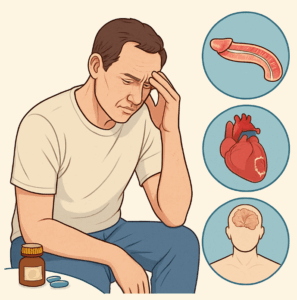Premature Ejaculation (PE): Causes, Symptoms, and Treatment Options
Premature Ejaculation (PE) is one of the most common male sexual health concerns. It is defined as ejaculation that occurs sooner than desired—typically within one minute of penetration—causing distress, lack of control, and dissatisfaction for one or both partners.
PE can affect confidence, intimacy, and overall relationship satisfaction. The positive news is that effective treatments exist, ranging from behavioral strategies to medical interventions.
What Is Premature Ejaculation?
PE occurs when a man ejaculates with minimal stimulation and before he wishes, either during or shortly after penetration. Occasional episodes are common, but if the issue persists and causes distress, it may be diagnosed as premature ejaculation.
Symptoms of Premature Ejaculation
-
Ejaculation within one minute of penetration (lifelong PE)
-
Inability to delay ejaculation in most sexual encounters
-
Lack of control over timing of orgasm
-
Emotional distress, frustration, or avoidance of intimacy
Causes of Premature Ejaculation
Physical Causes
-
Hormonal imbalances (e.g., abnormal serotonin levels)
-
Inflammation or infection of the prostate or urethra
-
Thyroid problems (especially hyperthyroidism)
-
Genetic or neurobiological factors
Psychological Causes
-
Performance anxiety
-
Relationship stress
-
Depression or mood disorders
-
History of sexual trauma or conditioning from early experiences
Lifestyle & Contributing Factors
-
Irregular sexual activity (long gaps between encounters)
-
High stress levels
-
Substance use (alcohol, drugs)
-
Erectile dysfunction (sometimes PE occurs secondarily)
Diagnosis of Premature Ejaculation
A healthcare provider may:
-
Take a detailed medical and sexual history
-
Assess timing and frequency of ejaculation during intercourse
-
Rule out underlying physical conditions (thyroid, prostate, or neurological issues)
-
Evaluate psychological and relational factors contributing to distress
Treatment Options for Premature Ejaculation
Medical Treatments
-
Topical anesthetics (numbing creams/sprays to delay ejaculation)
-
Oral medications (SSRIs such as paroxetine, sertraline, dapoxetine in some countries)
-
Phosphodiesterase inhibitors (sometimes used if ED coexists)
Psychological & Behavioral Treatments
-
The start–stop technique (pausing stimulation before climax)
-
The squeeze technique (applying pressure to the penis to delay orgasm)
-
Sex therapy to address anxiety and improve control
-
Couples therapy to reduce relationship tension and improve communication
Lifestyle Changes
-
Practicing mindfulness and relaxation exercises
-
Reducing alcohol and avoiding recreational drugs
-
Maintaining regular sexual activity or masturbation routines
-
Exercise and stress reduction for overall sexual health
Outlook
Premature Ejaculation is one of the most treatable male sexual concerns. With the right combination of medical, psychological, and behavioral approaches, most men experience significant improvement. An integrated approach often leads to long-term results and greater relationship satisfaction.
✅ If you’re struggling with PE, you’re not alone. Quick fixes don’t address the root causes, but with proper guidance, recovery is possible. Our clinic provides confidential, evidence-based support tailored to your health, your relationship, and your goals.
Dr. Srinivas Rajkumar T
MD (Psychiatry), AIIMS New Delhi
Consultant Psychiatrist – Child, Adult & Geriatric Psychiatry
Apollo Clinic, Velachery, Chennai
📞 Contact/WhatsApp: 85951 55808
